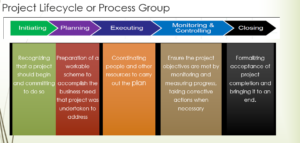First we should know what is a project, usually people are confused between project & operations. They call operations as project.
Project:
A project is a temporary endeavor undertaken to produce a unique product or service
The characteristics of projects are
- Specific start and end date
- Has a defined objective
- Series of tasks to achieve a defined outcome or objective
Projects are undertaken to full-fill objectives by producing deliverables. The deliverables may be tangible or intangible.
Fulfillment of project objectives may produce one or more deliverables like
- Unique product ( a complete product or enhancement of a existing product or correction of product etc.)
- Unique service ( a support function)
- Unique result ( new process, documents etc.)
- Unique combination of one or more of the above.
The temporary nature of project indicate that it have a definite start & end date. Temporary doesnt means that the project have to be short duration like months, projects can span for years duration.
while operations is concerned with the ongoing production of goods or services.
Project Management:
Project management is the application of knowledge, skills, tools & technique to the project activities to meet the project requirement. Project management enables the organization to execute the projects effectively & efficiently.
The core component of project management are
- Business case for why a project is necessary
- Capturing project requirements, specifying quality of the deliverable, estimating resources and timescales
- Developing and implementing a management plan for the project
- Leading and motivating the project delivery team
- Managing the risks, issues and changes on the project
- Monitoring Project progress against plan
- Managing the project budget
- Maintaining communications with stakeholders and the project organisation
- Procurement management
- closing the project in a controlled fashion when appropriate.
Effective project management helps organization to
- Meet business objectives
- Meet stakeholders expectations
- Increase chance of successful project
- Manage constraints
- Manage risks in timely manner
- Control changes
Poorly managed project with out project management will fail & result in
- Missed deliverables
- High cost
- Poor quality
- Rework
- Lost of reputation for organization
- Unsatisfied stakeholders
It is the responsibility of IT project manager to make sure the projects are completed successfully. We can cover more about the project manager responsibilities in upcoming days.
Project management is used in most of the industries
- Transport and infrastructure
- IT
- Product manufacture
- Building and construction
- Regulatory changes in finance and law
Lot of people do project management in current organization because of they are promoted to this position as they were doing good in their Job, they must have been good in technical topics & they are promoted to PM role assuming they will do good in this position also.
The project management basics is to use project management skills, tools, technologies to make sure that the projects are completed successfully, tailor the project management principles suiting for your project & organizational needs.
you need to be patient when taking the role of Project manager, the first step to the Project management is the right education.
There are 5 Project management process group as listed below
- Initiating
- Planning
- Executing
- Monitoring & controlling
- Closing
You don't need to start with a degree, learn from experience at the same time understand the project management terminologies, concept, benefits of right project management through CAPM, PMBOK , Prince2 similar courses & completing certifications will give additional value. Certified project managers will have more value in the market than others.
To become an expert project management professional, throughout your career, you will find yourself learning new skills. This is because no two projects are ever the same. Also, you will find that each project comes with its own set of unique challenges, forcing you to make changes to your plan of action for each of these.
In upcoming post we will be talking in detail about 5 process groups
There are 49 knowledge areas as per PMBOK and the same we will be also covered in later posts.
- Develop Project charter
- Identify Stakeholders
- Develop Project management plan
- Plan Scope management plan
- Collect requirements
- Define scope
- Create WBS
- Plan schedule management (Project time management)
- Define activities
- Sequence activities
- Estimate activity duration's
- Develop schedule
- Plan cost management
- Estimate costs
- Determine budget
- Plan quality management
- Plan resource management
- Estimate activity resources
- Plan communication management
- Plan risk management
- Identify risks
- Perform qualitative risk management
- Perform quantitative risk management
- Plan risk response
- Plan procurement management
- Plan stakeholder management
- Direct & manage project work
- Manage project knowledge
- Manage quality
- Acquire resources
- Develop team
- Manage team
- Manage communications
- Implement risk responses
- Conduct procurement's
- Manage stakeholder engagement
- Monitor and control project work
- Perform integrated change control
- validate scope
- Control scope
- Control schedule
- Control cost
- Control quality
- Control resources
- Monitor communications
- Monitor risks
- Control procurement's
- Monitor stakeholder engagement
- Close project or phase
The 49 Processes can be clubbed in to group of 10 knowledge areas which are
- Project Integration Management
- Project Scope Management
- Project Schedule Management
- Project Cost Management
- Project Quality Management
- Project Resource Management
- Project Communication Management
- Project Risk Management
- Project Procurement Management
- Project Stakeholder Management

